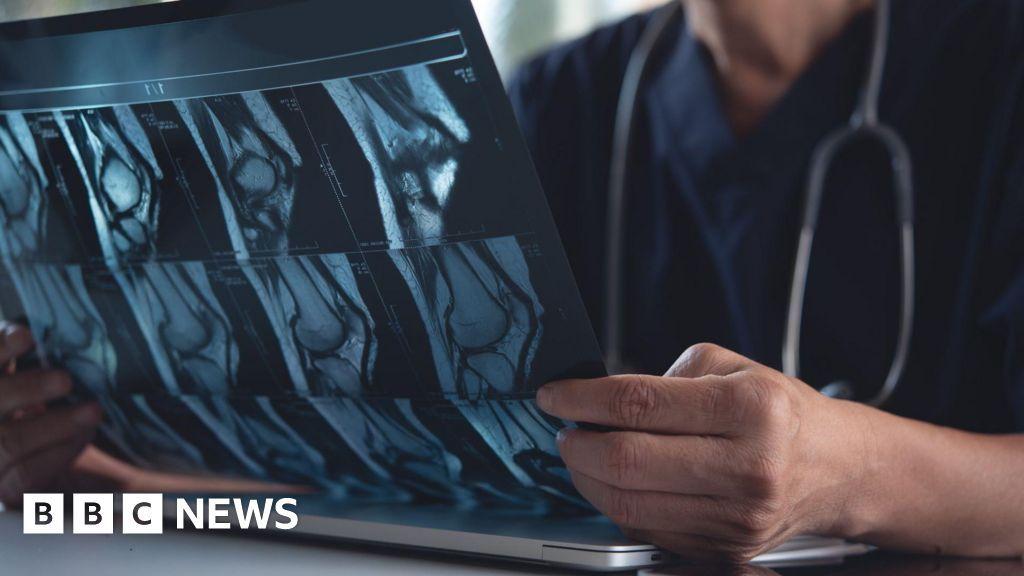AI System Revolutionizes Osteoporosis Detection Using Routine X-ray Images
2 Sources
2 Sources
[1]
AI system estimates bone density using routine X-ray images
WileyJul 9 2025 Investigators have developed an artificial intelligence-assisted diagnostic system that can estimate bone mineral density in both the lumbar spine and the femur of the upper leg, based on X-ray images. The advance is described in a study published in the Journal of Orthopaedic Research. A total of 1,454 X-ray images were analyzed using the scientists' system. Performance rates for the lumbar and femur of patients with bone density loss, or osteopenia, were 86.4% and 84.1%, respectively, in terms of sensitivity. The respective specificities were 80.4% and 76.3%. (Sensitivity reflected the ability of the test to correctly identify people with osteopenia, whereas specificity reflected its ability to correctly identify those without osteopenia). The test also had high sensitivity and specificity for categorizing patients with and without osteoporosis. Bone mineral density measurement is essential for screening and diagnosing osteoporosis, but limited access to diagnostic equipment means that millions of people worldwide may remain undiagnosed. This AI system has the potential to transform routine clinical X-rays into a powerful tool for opportunistic screening, enabling earlier, broader, and more efficient detection of osteoporosis." Toru Moro, MD, PhD, corresponding author, University of Tokyo Wiley Journal reference: Moro, T., et al. (2025). Development of Artificial Intelligence‐Assisted Lumbar and Femoral BMD Estimation System Using Anteroposterior Lumbar X‐Ray Images. Journal of Orthopaedic Research. doi.org/10.1002/jor.70000.
[2]
AI-based test detects early signs of osteoporosis from X-ray images
Investigators have developed an artificial intelligence-assisted diagnostic system that can estimate bone mineral density in both the lumbar spine and the femur of the upper leg, based on X-ray images. The advance is described in a study published in the Journal of Orthopaedic Research. A total of 1,454 X-ray images were analyzed using the scientists' system. Performance rates for the lumbar and femur of patients with bone density loss, or osteopenia, were 86.4% and 84.1%, respectively, in terms of sensitivity. The respective specificities were 80.4% and 76.3%. (Sensitivity reflected the ability of the test to correctly identify people with osteopenia, whereas specificity reflected its ability to correctly identify those without osteopenia). The test also had high sensitivity and specificity for categorizing patients with and without osteoporosis. "Bone mineral density measurement is essential for screening and diagnosing osteoporosis, but limited access to diagnostic equipment means that millions of people worldwide may remain undiagnosed," said corresponding author Toru Moro, MD, Ph.D., of the University of Tokyo. "This AI system has the potential to transform routine clinical X-rays into a powerful tool for opportunistic screening, enabling earlier, broader, and more efficient detection of osteoporosis."
Share
Share
Copy Link
Researchers have developed an AI-assisted diagnostic system that can estimate bone mineral density from X-ray images, potentially transforming osteoporosis screening and detection worldwide.
AI-Powered Bone Density Estimation from X-rays
Researchers have developed a groundbreaking artificial intelligence (AI) system that can estimate bone mineral density using routine X-ray images, potentially revolutionizing the screening and diagnosis of osteoporosis. The study, published in the Journal of Orthopaedic Research, demonstrates how this AI-assisted diagnostic tool could transform standard clinical X-rays into a powerful screening method for bone density loss
1
2
.Study Details and Performance

Source: News-Medical
The investigation analyzed a total of 1,454 X-ray images using the newly developed AI system. The results showed impressive performance rates for detecting osteopenia, a condition characterized by low bone mass that often precedes osteoporosis:
- Lumbar spine: 86.4% sensitivity, 80.4% specificity
- Femur (upper leg): 84.1% sensitivity, 76.3% specificity
These figures indicate the system's ability to correctly identify individuals with and without osteopenia. Additionally, the AI demonstrated high sensitivity and specificity in categorizing patients with and without osteoporosis
1
2
.Potential Impact on Global Health
Dr. Toru Moro, the corresponding author from the University of Tokyo, emphasized the significance of this development: "Bone mineral density measurement is essential for screening and diagnosing osteoporosis, but limited access to diagnostic equipment means that millions of people worldwide may remain undiagnosed"
1
.The AI system has the potential to address this global health challenge by:
- Transforming routine clinical X-rays into screening tools
- Enabling earlier detection of osteoporosis
- Broadening access to bone density assessments
- Improving the efficiency of osteoporosis diagnosis
Related Stories
Implications for Healthcare

Source: Medical Xpress
This AI-assisted diagnostic system could have far-reaching implications for healthcare, particularly in areas with limited access to specialized bone density measurement equipment. By utilizing commonly available X-ray machines, the technology could significantly increase the number of people screened for osteoporosis, leading to earlier interventions and potentially better health outcomes
1
2
.Future Prospects
While the study results are promising, further research and validation will likely be necessary before widespread clinical implementation. However, this development represents a significant step forward in leveraging AI technology to improve diagnostic capabilities in orthopedics and osteoporosis management.
As AI continues to advance in medical applications, we may see similar innovations in other areas of healthcare, potentially revolutionizing disease detection and patient care across various medical specialties.
References
Summarized by
Navi
[1]
[2]
Related Stories
Recent Highlights
1
ByteDance's Seedance 2.0 AI video generator triggers copyright infringement battle with Hollywood
Policy and Regulation

2
Demis Hassabis predicts AGI in 5-8 years, sees new golden era transforming medicine and science
Technology

3
Nvidia and Meta forge massive chip deal as computing power demands reshape AI infrastructure
Technology








